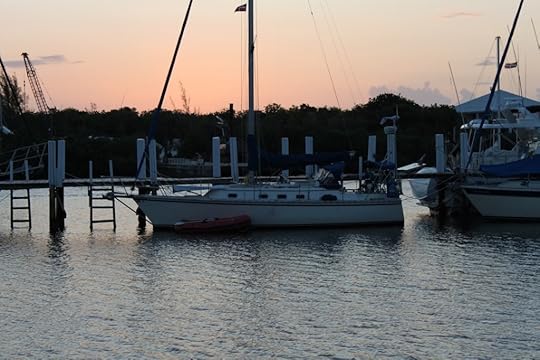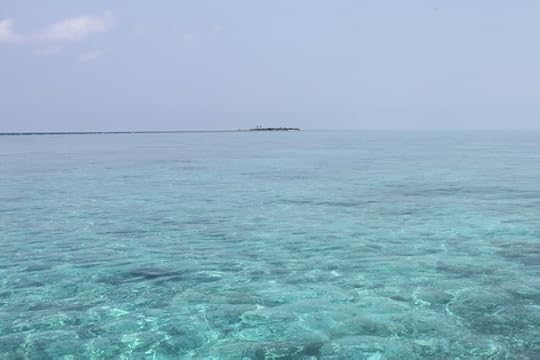Self Reliance
by Christine Kling
 I'm sitting here in the cockpit of my boat tied to a little dock in Black Sound in Green Turtle Cay. Off in the distance I can hear music drifting over the top of the island. It's the Gully Roosters playing some Rake and Scrape at Sundowners over in the village at New Plymouth. Here at the dock, it is nothing but me and a billion stars and the soft gurgle as the wind pushes the water under my stern. I walk the decks, checking the dock lines and making sure the boat will ride the tide well during the hours that I sleep.
I'm sitting here in the cockpit of my boat tied to a little dock in Black Sound in Green Turtle Cay. Off in the distance I can hear music drifting over the top of the island. It's the Gully Roosters playing some Rake and Scrape at Sundowners over in the village at New Plymouth. Here at the dock, it is nothing but me and a billion stars and the soft gurgle as the wind pushes the water under my stern. I walk the decks, checking the dock lines and making sure the boat will ride the tide well during the hours that I sleep.
When Ralph Waldo Emerson wrote about "Self Reliance" in his famous essay, he was mostly advising his readers not to be afraid to be different, to trust their inner voices and not feel compelled to follow the crowd. I think this advice is great for writers because chasing fads never quite works out. If you decide to try to write teenage vampire books because they are hot, they will certainly not be the thing by the time you have finished yours.
But when sailors talk about self reliance, it means something a bit different. Yes, by virtue of wanting to head out to sea, we are already marching to a different tune than most folks out there. But the type of self reliance I would like to write about tonight is the idea that if you choose to go to sea, you should do everything in your power to make your voyage as safe as possible before departure. And ignorance, especially, is no excuse. It is your responsibility to educate yourself and to take care of yourself.
This is not to say that we will not have things go terribly wrong at times no matter how well prepared we are. And sometimes, we can't do it alone and we reach out to others for help. So then we get to this question: should we legislate requirements for preparedness? Right now, the requirements we have in the states for fire extinguishers and a few flares and life jackets don't really address this problem. Should someone who has never done much of any boating be allowed the freedom to go offshore — and possibly call for help putting in motion a multi-million dollar search and rescue effort?
I'm thinking about all this under this starry sky tonight because of the experience I had crossing the Gulf Stream last week between Fort Lauderdale and West End. I am going to refer to the boat I traveled with as the Buddy Boat. I was introduced to the captain in a bar, but that's a place where many accomplished sailors are known to hang out. A friend said, "Since you are both crossing to the Abacos, why don't you travel together?" It never occurred to me to quiz him on his boating knowledge. Note to self — next time, quiz away.
We left at 11:00 p.m. We had intended to leave at dusk, but a thunderstorm passed over Fort Lauderdale that night, and I suggested we wait it out. The forecast was for 5-7 knots of wind, seas flat. About 4 miles outside Fort Lauderdale, their engine quit. They said it had overheated. They had tried to open their raw water strainer, but they couldn't get it open. Clearly, they hadn't checked it before leaving the dock.
They said they would give it an hour to cool down, so I circled while they drifted. Finally, their engine started up again so onward we went. Only this same thing happened again a few hours later. They were disappearing behind me, and I couldn't raise them on the radio, so I turned around and motored a couple of miles back to get inside their very short radio range. Now the lights of the mainland were barely visible. We were well into the shipping lanes. They put up their big genny and started to sail along at about 2- 3 knots. I kept pace with them doing half the speed I was capable of doing. It was a long night.
By day break, we were both sailing a bit. The forecast was for a trough to pass over us and bring 14-15 knots of wind. I was looking forward to increasing our speed, but the winds after the trough were gusting to 20 and by mid-morning, that was when things really started to go wrong on the Buddy Boat. I had put a reef in my main and rolled up the job partially, so I was sailing along at a good clip. I looked back and they were so far behind me that they were nearly below the horizon. Again, I turned around and motored back because I got no answer on the radio unless I was within about a half mile of them. Motoring back, my engine quit. I reckoned it was a clogged fuel filter, so I switched to the clean one and went below to bleed the engine. This is not fun in 15-20 knots of wind. By the time I got the engine running again, I decided I didn't want to clog the second filter in the rough seas, so I would save my engine for getting into the harbor. When I went topsides, the Buddy Boat was about 3 miles off headed forty degrees off course. They were back to motoring and through the glasses I saw that their mainsail had a twist in it. I couldn't tell if it had blown out or what.
Finally, after chasing them going in the wrong direction for two hours, I got close enough to hail them on the radio. I only caught them because their engine had quit again.
"Where are you going?" I asked.
"Uh, we had a little GPS miscalculation. What course should we be doing?"
By this time I was banging the radio microphone against my forehead. "West End is about 14 miles off on a bearing of 45 degrees."
"Okay, we'll change course. But our engine has quit again, and we lost the jib halyard up the mast when changing sails. You can see our main isn't much good."
Again, hitting my forehead with the microphone. It was 3:30 p.m. I was tired from being up all night, and I wanted to get into West End in daylight. "Look, if I tack now, I can make it into port before dark. I don't know if I can take another night out here. Should I go on ahead?"
"Yes. Our engine will cool down and run again. And if the seas calm down we might try going up the mast to retrieve the halyard."
Yeah, and one of you might die in the process. I could see that they couldn't sail, their engine was nearly useless, their radio had a range of less than a mile, and though they did have several GPS's aboard, I wasn't sure at this point that they knew how to use them.
"Do you want me to call BASRA? Bahamas Air and Sea Rescue?"
"No, we'll be fine."
So I left them. I sailed hard for the next three and a half hours beating under reefed sails and having my rudder stall completely several times in the gusts that were clocking my anemometer at 25 knots, but they were picking up spindrift so may have been higher. My autopilot couldn't handle it, and I have to admit, as I wrestled with that wheel, I called those gusts every curse word I knew.
Once I was in and safely tied up (having taken 20 hours instead of the 13 I thought I would), I went to the marina office and we tried calling the Buddy Boat several times with their higher antenna. No luck. I found a fellow who would be willing to go out and fetch them, but he wanted to have a position. I needed to make radio contact first. I used Skype to call TowBoat US in Palm Beach, and I asked them to call on their powerful radio and to keep a look out for them. I figured they would drift back out into the Gulfstream and they'd get blown back to the mainland eventually, but it might be up around St. Augustine. I kept calling until nearly 11:00 p.m. when I just had to go to sleep.
All evening, I kept wondering if I should call the US Coast Guard or BASRA. They were in a sound hull with plenty of food and water, and they were not headed for a lee shore – for a while anyway. They had said no to a rescue, so I didn't make that call. Ready or not, they needed to be self reliant.
I found out later that they made their way to shallow water off Wood Cay about 2 miles west of West End and anchored there. 
In the morning, I fueled up and took off for Mangrove Cay and on to Green Turtle the next day. Just after passing through the Indian Cay Channel, I took this photo of Wood Cay off my stern. When I look at the high res version, I can actually see the sailboat anchored on the ocean side of the cay.
Here in Green Turtle, I got an email from the Buddy Boat that they had made it to the anchorage off West End and they were going to take the bus to Freeport to get some new fuel filters. They had left Lauderdale without any spares. But I didn't think that was going to solve their overheating problem. They supposedly left West End and crossed through Indian Cay cut three days ago. There has been no more word. I don't know if they are stranded on a reef or sand bar, or anchored out on the banks somewhere once again waiting for their engine to cool down.
I know we can't legislate good sense, but what do we do about boaters like the Buddy Boat who think they can buy an old beat up boat and take off on a 70-mile offshore passage with little or no knowledge or experience?
At any rate, I learned something from it all to add to my own self reliance. The next time somebody suggests I buddy boat, you bet I'm going to have a lot of questions to ask before I agree.
Fair winds!
Christine
Share on Facebook



